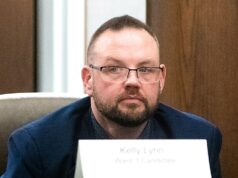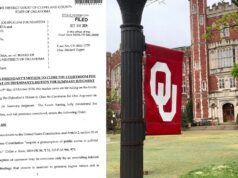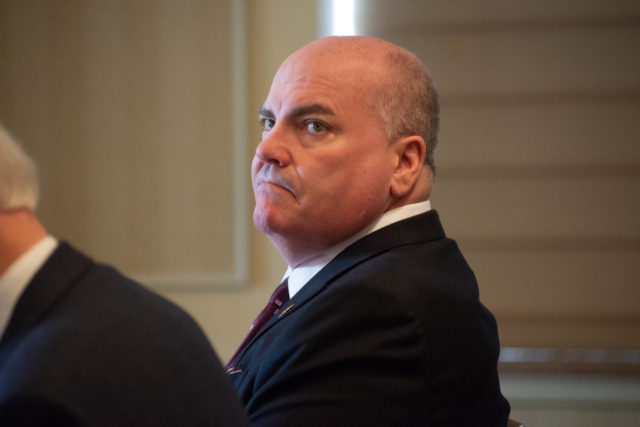

As unanswered questions linger regarding a two-year, resource-draining legal battle over accusations that he embezzled $7.4 million from his former employer, Phil Albert has resigned from the University of Oklahoma Board of Regents.
Once one of the most prolific political donors in Oklahoma, Albert had one year of service remaining in his seven-year term on the OU Board of Regents. Typically, an OU regent serves as board chairperson during their final year, but the significant allegations still facing Albert may have made the concept of his chairmanship unpalatable in a time when the board has emphasized reducing “drama” surrounding the university.
The former president of Claremore-based Pelco Structural, Albert did not return a phone call seeking comment about his resignation Sunday. In late 2019 and early 2020, Albert declined to answer questions about the embezzlement allegations against him, instead asking for time to respond in civil court and directing NonDoc to speak with his lawyers.
“Mr. Albert was shocked and dismayed when [Pelco Structural co-founder] Phil Parduhn’s sons abruptly forced him out of the company. We are now engaged in a business divorce,” Albert’s attorney, Paul DeMuro, said in a statement Nov. 26, 2019. “Like in many divorces, emotions run high, and inflammatory allegations are made. We intend to pursue vigorously Mr. Albert’s claims, and separate the wheat from the chaff on the claims against him.”
But nearly two years after his civil litigation with Pelco Structural began, the seed remains husked in district court. Compounding matters for the now-former OU regent, Albert saw DeMuro and his other attorneys withdraw from his defense in September 2021.
“Albert is without resources to defend himself and unable to pay (…) continued attorneys fees and expenses,” the lawyers wrote in their court motion to withdraw.
According to a Pelco court filing, Albert made a similar statement in April 2021 in response to the company’s written discovery requests while the dispute was in arbitration: “Claimant Phillip B. Albert is without resources at this time to respond to Pelco Structural, LLC’s discovery requests.”
The company wrote that, in May 2021, “counsel for Albert represented that Albert would participate only in settlement negotiations, and no other substantive proceedings, including not appearing at a deposition, even if noticed pursuant to the discovery rules as agreed.”
“Pelco thereafter moved to terminate the arbitration on the basis that Albert refused to pay his agreed portion of the arbitrator’s fees and refused to participate therein,” the company’s attorneys wrote in an Aug. 25 motion to reopen the case in Rogers County District Court.
Judge David Bandy has not ruled on that motion. Albert filed noticed with the court in October that he would be representing himself pro se.
Gov. Kevin Stitt said Friday he will nominate someone to fulfill the final year of Albert’s unexpired term, which concludes March 21, 2023.
“Phil Albert served the University of Oklahoma well during his time as a regent,” Stitt said in a press release. “I will be considering candidates to replace him who are committed to ensuring OU is a strategic partner as we strengthen Oklahoma’s workforce and produce graduates with skills and degrees that meet the needs of our state’s growing economy.”
Albert’s resignation means Stitt will have two decisions to make regarding OU Board of Regents nominees this spring. Current Chairman Michael Cawley was appointed in December 2019 to fill the unexpired term of Renzi Stone, who had resigned two months earlier after an unusual lunch meeting that named Gary Pierson as chairman-elect of the board.
“OU is thankful to Phil Albert for his years of service and dedication to our university,” OU President Joe Harroz said in Stitt’s press release. “As a regent, he has demonstrated an ardent passion for our university and our students, and we sincerely appreciate his counsel these past six years.”
Background on the allegations facing Phil Albert
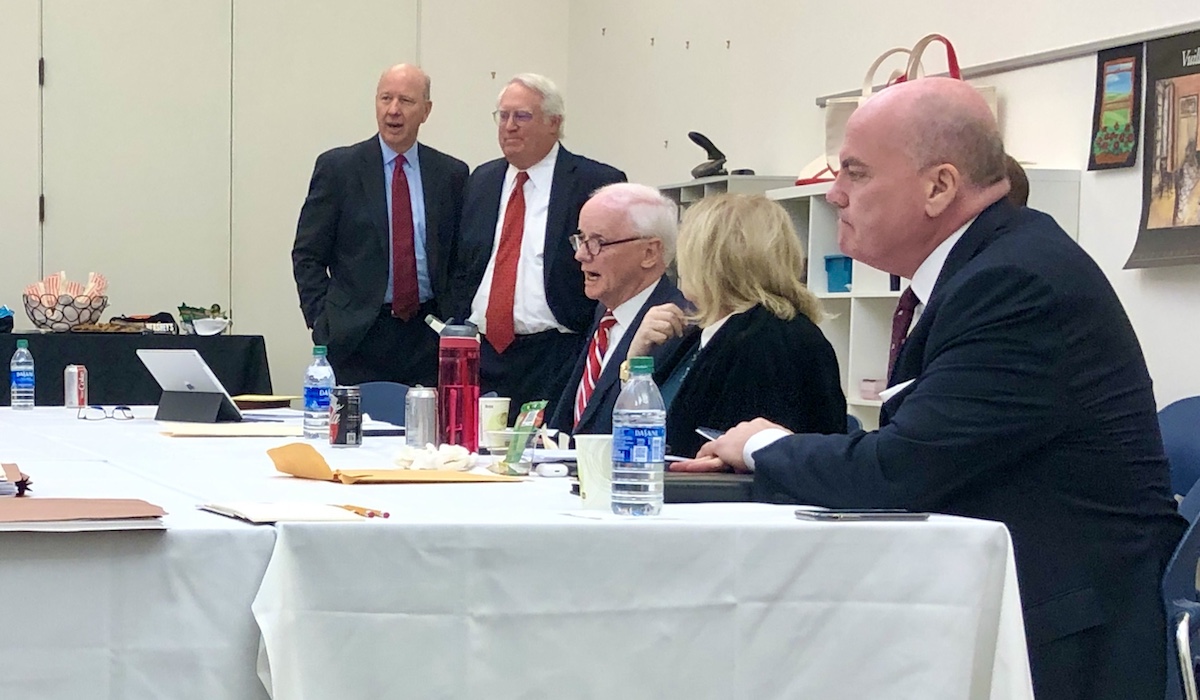
Although the accusations against Albert loomed over more than two years of his OU Board of Regents service, the Oklahoma Baptist University graduate attended meetings dutifully, but his public remarks constricted considerably.
The gravity of the situation was particularly apparent at the December 2019 board meeting, when he sat solemnly in a Fred Jones Jr. Museum of Art classroom named after the man he had succeeded on OU’s board. The longtime accountant and steel pole manufacturing executive barely spoke during a half-dozen committee meetings and presentations, listening to his peers at lunch as former Gov. Frank Keating chatted with Eric Stevenson and Natalie Shirley made small talk with journalists.
A sizeable man, Albert slumped under the weight of the elephant in the room: One week earlier, on Nov. 26, Albert’s former employer had filed litigation counterclaims that accused him of embezzling $7.4 million from Pelco Structural, a company he helped Phil Parduhn found in 2005 and that he ran until Parduhn’s sons terminated him in April 2019.
Pelco attorneys made the allegations — which involve reimbursements, tax payments, political contributions and an “improperly authorized” loan advance — in a series of counterclaims to a wrongful termination lawsuit Albert had filed three weeks earlier.
In his lawsuit, Albert alleged that he was owed disbursements from a Pelco subsidiary of which he said he owned a 25 percent stake. In addition, he said Pelco was denying him access to “personal documents and records, autographed books, art work, decorative bowls, coffee table, vases and sculptures.”
But on Nov. 25, 2019, attorneys for Pelco responded with 10 pages of allegations that Albert “has stolen and embezzled (Pelco) Structural funds for his personal use and benefit” totaling “at least $7.4 million.”
“The unauthorized payments described as ‘reimbursements’ were taken in large, even dollar amounts, and paper checks for same were mailed to Albert via Federal Express at (Pelco) Structural’s office,” Pelco attorneys wrote. “For example, a single ‘reimbursement’ in 2015 was for $200,000. A second single ‘reimbursement’ in 2015 was for $140,000.”
In Pelco attorneys’ counterclaims, Albert’s use of Pelco Structural credit cards also faced allegations:
Albert used Structural credit cards to charge $169,635.69 in personal expenses including, among other things, fine jewelry, custom men’s suits, fine dining, flowers and casino charges, unrelated to Structural operations and solely to benefit Albert and elevate his personal reputation and standing in the community and to those upon whom he bestowed gifts and contributions.
(…)
Albert used Structural credit cards to make donations to various community organizations and nonprofits. Some, but not all, are legitimate contributions on behalf of Structural. From Jan. 1, 2010, to April 19, 2019, Structural credit card account statements reflect charitable or community organization contributions of $473,549.84 and that resulted in no philanthropic benefit for Structural. Moreover, numerous such contributions were claimed by Albert (and his spouse Joan Albert) to be a personal contributions on his/their behalf with the Internal Revenue Service and Oklahoma Tax Commission.
Attorneys alleged that Albert and former Pelco Structural controller Don Eagleton coded questionable financial transactions to the company’s “Scrap Income” or “Scrap Metal” accounts.
The company alleged that Albert charged about $158,000 in “personal travel expenses” to Pelco’s credit cards, as well as more than $1 million in “miscellaneous” charges:
Albert charged to Structural credit cards $1,107,917.31 in other miscellaneous expenditures and that are unrelated to Structural business. These miscellaneous charges included, but are not limited to, costs for art, flowers, custom clothing, maternity and baby stores, cigars, movies, restaurants, hotels, iTunes purchases, and retail home decor, furnishing and gift stores.
The company also alleged that Albert “paid himself cash, paid personal expenses and made charitable or community donations direct from the Structural operating accounts,” which are maintained by BancFirst and RCB Bank. (At one time, Albert reportedly was a member of a BancFirst advisory board.) Pelco attorneys alleged that Albert drew 47 cashier’s checks from the BancFirst operating account and 41 cashier’s checks from the RCB Bank account, “none of which have supporting documentation in Structural records as to their purpose.”
Of those 88 cashier’s checks, attorneys wrote that 22 were made in “even dollar amounts and made payable to Albert directly.” Those 22 checks totaled $253,000 and “were deposited in a Bank of Oklahoma account, the owner of which is unknown to Structural.”
The attorneys also alleged that Albert used company funds to pay $67,999 to the IRS for the personal federal income taxes of Albert and his wife.
“This check was coded to Structural’s WIP-Overhead account in order to conceal it from the other managers and members of Structural,” the attorneys wrote.
They also alleged that Albert “made contributions to political campaigns, as well as charitable and community organizations, from the Structural operating accounts at BancFirst and RCB Bank, totaling $315,268.82 that appear to have been made for Albert’s benefit and as part of a philanthropic business initiative that did not benefit Structural.”
The final allegation in Pelco’s countersuit involved a $450,000 “loan advance” on a Pelco Structural line of credit that the company says was not deposited into any of its accounts.
“To date, that loan advance is unaccounted for and it is believed that Albert stole and/or embezzled this amount for his personal use,” Pelco attorneys wrote in November 2019.
Both court filings are embedded below.
Over four years, Albert made $105,000 in political donations
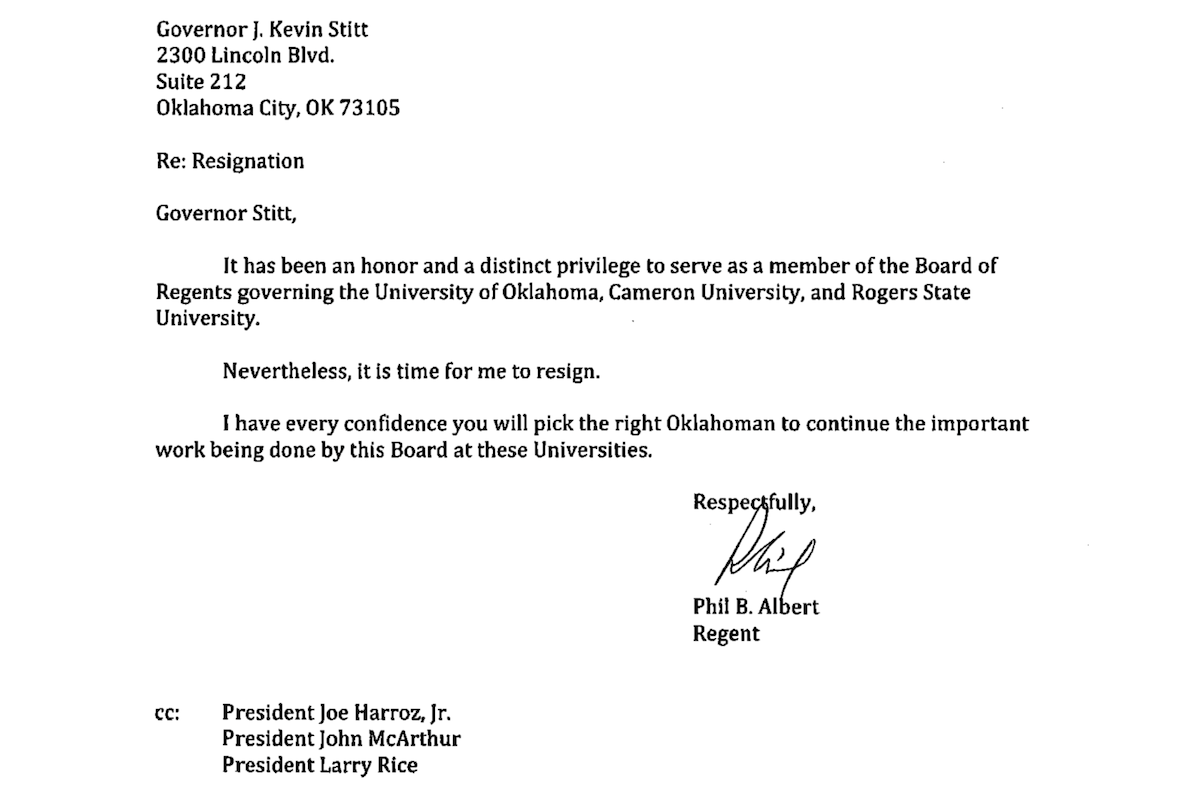
If true, the allegations outlined by Pelco Structural attorneys could be viewed by state and federal prosecutors as criminal in nature.
Pelco officials and their attorneys declined to comment on their allegations in 2019. They specifically declined to say whether they had made any report of their embezzlement allegations to state or federal law enforcement.
That Albert made significant contributions to entities, causes and political candidates can be well documented. During his time at Pelco, he became a civic leader in Claremore and served as chairman of the Tulsa Regional Chamber of Commerce in 2017. He was profiled and lauded for his work in growing Pelco’s statewide footprint. (Pelco manufactures large steel poles for commercial, utility and athletic stadium use.)
Albert was even one of the state’s most prolific donors to political campaigns. According to records from the Oklahoma Ethics Commission, Albert donated more than $105,000 to candidates and committees from Jan. 1, 2014, through Dec. 31, 2018.
For comparison, Albert donated more money to politicians during that period than other prominent political donors, such as attorney Bob Burke ($88,600), attorney Richard Bell ($76,300), banker Gene Rainbolt ($65,500), businessman Brad Naifeh ($47,694.63), oil executive Larry Nichols ($47,400) and oil executive Harold Hamm ($23,600).
Only donors such as banker George Kaiser ($189,350), QuikTrip founder Burt Holmes ($171,400) and apartment magnate and current State Regent for Higher Education Jay Helm ($158,700) contributed more cash to political candidates from 2014 through 2018.
Follow @NonDocMedia on:
Familial connections to New Dominion, GRDA
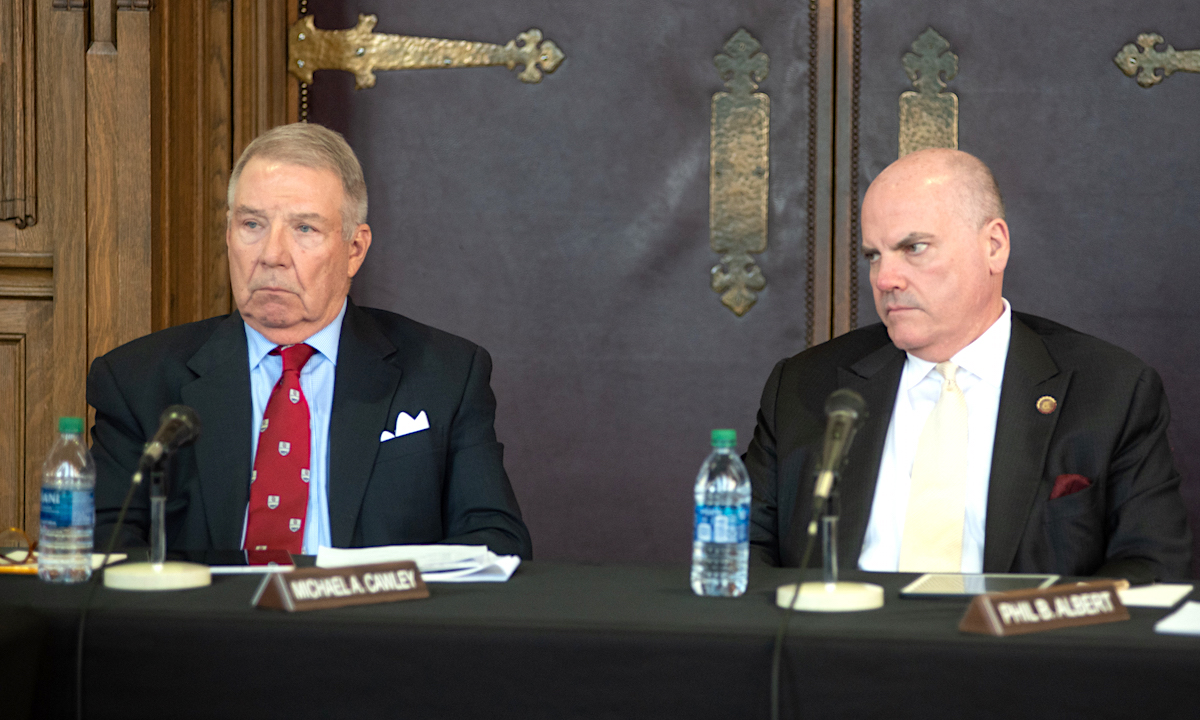
Pelco Structural’s countersuit was not the first time a company named Albert in a lawsuit. In 2015, Albert was listed as a defendant when the now-defunct New Source Energy Partners sued New Dominion, a petroleum extraction and wastewater disposal company for which Albert served as a director and, formerly, a vice president. (Albert’s LinkedIn page listed him as a New Dominion director in late 2019, but the page has now been deleted. His OU Board of Regents website biography was removed in late 2019.)
Albert is the brother-in-law of former New Dominion chairman and founder David Chernicky, who died in January 2021. An eccentric oilman, Chernicky pioneered technology used for the disposal of fracking wastewater and found himself maligned in the 2014 and 2015 public frustration over Oklahoma’s earthquake boom.
New Dominion currently employs former Sen. Kevin Easley (D-Tulsa) as its president and CEO. From 2004 until 2011, Easley served as executive director of the Grand River Dam Authority, a large public power utility that provides electricity to municipalities and private businesses in northeast Oklahoma and Arkansas. In 2009, Chernicky — Albert’s brother-in-law — was appointed to the Grand River Dam Authority board, eventually becoming chairman before resigning in 2012.
Months after Easley left GRDA in 2011 and became president of New Dominion, a state audit cast criticism on $5.2 million in GRDA contracts awarded to Pelco Structural — run by Albert at the time — for electrical power poles. Then-State Auditor and Inspector Gary Jones wrote that although Albert’s familial and corporate relationships with Chernicky were not prohibited by GRDA guidelines, they were also not disclosed.
“Of the six (GRDA) directors we visited with, five were not aware of this relationship, and the one director who did know about it discovered it through his own research,” Jones wrote. “We asked the board chairman (Chernicky) if he ever voted to award funds to Pelco. He did not recall the matter ever presenting itself, but stated that he would have abstained had it ever occurred. However, board minutes indicate he voted ‘yes’ in all instances except one when he was absent. Accounting records indicate approximately $5.2 million was paid to Pelco since 2006.”
Phil Albert’s lawsuit against Pelco Structural
(Update: This article was updated at 12:30 p.m. Monday, Jan. 24, to include a screenshot of Phil Albert’s resignation letter.)









